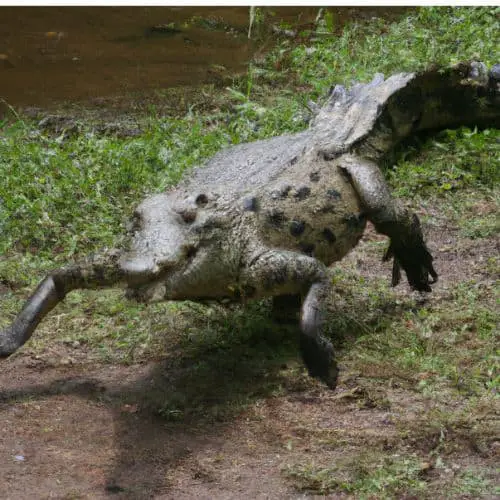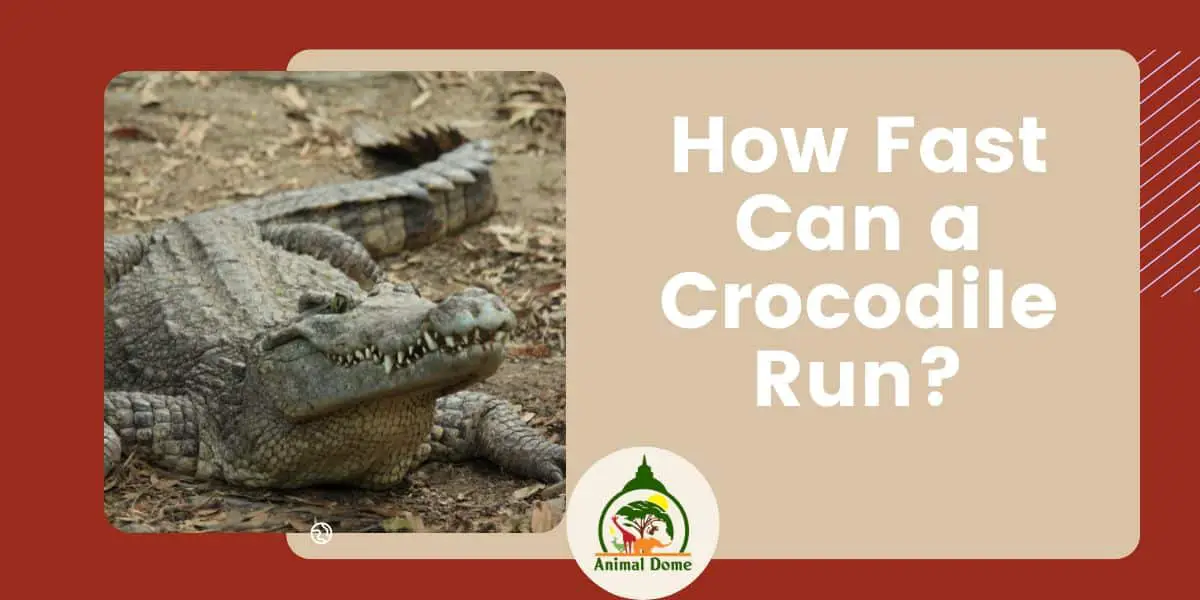The sneaky hunting habits of crocodiles make them dangerous animals to be around. However, their speed isn’t something you should be worried about if you’re going on a wildlife expedition on the continents where you can find crocodiles. If you’ve been asked: how fast can a crocodile run? You’ve probably not expected it, but there’s no definite answer, as there are different species of crocodiles.
Of the 18 crocodile species across North and South America, Africa, Asia, and Australia, the dwarf crocodile runs 17km per hour (11 mph), the saltwater crocodile runs about 29 km per hour (18 mph), the American crocodile hits 32 km per hour (20 mph). The Nile crocodile reaches 35 km per hour (22 mph).
You’ll get answers to your questions about the speed of crocodiles and compare them to an average human’s speed. You’ll also be able to tell if humans can outrun crocodiles.
How Fast Can a Crocodile Run on Dry Land?

Being a semi-aquatic reptile, you wouldn’t expect a crocodile to be fast on land compared to its prowess in the water. However, you still wouldn’t want to be chased by a croc as you don’t know how fast it can run on land, or do you?
It’s easy to attempt to judge your safety around an unfamiliar animal through figures you see, but the reality is usually different from scientific results. Crocodiles aren’t the fastest semi-aquatic animals on land but they aren’t the slowest either. Also, determining how fast a crocodile can run depends on some criteria.
The specie of the crocodile
There are 18 species of crocodile, but only 15 remain across five continents – Africa, Asia, Australia, North America, and South America. The different crocodile species have varying morphological details that influence their speed on land and water. Therefore, the speed of crocodiles varies with their species as they have similar but different musculoskeletal adaptations.
These are the average running speeds for the various species of crocodiles
| Species | Running Speed |
|---|---|
| American Alligator | 8 mph |
| Saltwater Crocodile | 11 mph |
| Nile Crocodile | 13 mph |
| Mugger Crocodile | 9 mph |
| Orinoco Crocodile | 9 mph |
| Slender-snouted Crocodile | 9 mph |
The size of the crocodile
Generally, we’ll assume that the bigger the croc, the slower it can run, but we’ll be wrong. Although the size of a crocodile may influence its speed, it also varies with species. A speedier crocodile species will run faster, regardless of its size, than a slower crocs species.
The terrain the crocodile is on
The terrain of the land also influences how fast a crocodile can run and how long it runs. Usually, a crocodile will run slowly on a rocky terrain compared to a flat land surface. It’ll also run longer on flat land surfaces than on rocky terrains.
Therefore, considering the species and size of crocodiles, there are four common species that you should know of their speed. They vary in size, and you can find them on any of the continents that have crocodiles.
- Dwarf crocodile (Osteolaemus tetraspis), the smallest of all crocodile species and found in West Africa, can run as fast as 11 miles per hour (17 km per hour).
- Saltwater crocodile (Crocodylus porosus), the largest crocodile species found in Southeast Asia and the Northern part of Australia, can run between 15 and 18 miles per hour (24 and 29 km per hour).
- American crocodile (Crocodylus acutus), fairly large and found in the Caribbean basin, including South Florida, can run up to 20 miles per hour (32 km per hour).
- The Nile crocodile (Crocodylus niloticus), large and aggressive and found in sub-Saharan Africa, runs between 19 to 22 miles per hour (30 to 35 km per hour).
How Far Can Crocodiles Run?
Speed is one thing, and distance is another. Going by the speed figures of these crocodile species, one may automatically assume they can continue at that speed for a long time, making them dangerous animals for any human to face (well, they can be). However, they can only maintain these peak speeds for so long.
Generally, a crocodile will not readily chase a human but will try to escape a threat. Even at that, you won’t find a crocodile that’ll run at a 50 meters stretch. The longest distance a crocodile will run is about 30 meters. The terrain of the land also influences how far a crocodile will run. A rocky terrain will require that it lifts its weight on its legs and bound over rocks, requiring it to spend more energy. Hence, the crocodile will tire quickly and may not cover up to 30 meters on rocky terrains.
Can Humans Outrun a Crocodile?
Wouldn’t we all want to race animals if we could? While it may not be a common occurrence, there’s the possibility that you might encounter a crocodile, and you’re wondering if you can outrun it. Yes, humans can outrun a crocodile, but only if you’re reasonably fit, depending on the crocodile species you’re facing.
The average human runs at 10 to 15 miles per hour, and that’s the average speed for saltwater crocodiles. This means humans can easily outrun dwarf crocodiles, and they may outrun saltwater crocodiles. However, with American crocodiles and Nile crocodiles, the average human speed may be insufficient to outrun them. But, considering that they cannot maintain that speed for more than 30 meters, humans stand a good chance of outrunning crocodiles, although it’ll be safer to avoid them altogether.
What to Do if a Crocodile is Chasing You?
This rarely happens, but if it does, run as fast as possible and cover as much distance as you can manage. Crocodiles won’t chase you for more than a 30 meters distance. Don’t try to run in a zigzag pattern; it’ll reduce your speed and give the crocodile a greater chance of catching you.
Also, don’t climb trees as crocodiles can also do the same. Although they don’t look it, they are fairly good tree climbers.
Final Thought
There are different crocodile species, and it isn’t easy to ascribe an average speed to them. However, the common species – American, the Nile, dwarf, and saltwater crocodiles have pretty good speeds that range from 11 mph to 22 mph amongst them. However, they can’t run for long distances, their average lengthy runs being about 30 meters.




